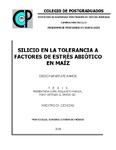Silicio en la tolerancia a factores de estrés abiótico en maíz.
Abstract
El maíz (Zea mays L.) es el tercer cereal más producido a nivel mundial, y en México el de mayor importancia debido a su alto consumo, pero los distintos agobios ambientales como lo son la salinidad y la sequía limitan su productividad. En este estudio se evaluó el efecto del silicio (Si) en la mitigación de estrés causado por sequía y salinidad en germinación, fase vegetativa y de producción, en maíz blanco híbrido SB-308. Se establecieron dos experimentos con sequía inducida, uno en germinación y otro en fase vegetativa, así como también, otros dos ensayos con salinidad, uno en germinación y otro en fase de producción. Dentro de los resultados más relevantes, encontramos que la salinidad retrasa severamente la germinación y en altas concentraciones esta se inhibe, presenta efectos negativos en la altura de plantas y disminuye la concentración y acumulación nutrimental. Asimismo, la sequía inhibe la germinación, disminuye la altura de plantas, longitud de raíz, variables de biomasa seca, conductancia estomática y tasa fotosintética. Por otra parte, la imbibición de semillas de maíz con 3.0 mM de SiO2 incrementa el porcentaje de peso en semilla, así como también, la longitud de radícula, peso de biomasa seca de vástagos y raíces, altura, concentración y acumulación nutrimental sin condiciones de agobio. En condiciones de estrés por sequía y salinidad, la adición de Si mitiga los efectos negativos que estos agobios ocasionan en la altura de plantas de maíz. _______________ SILICON ON TOLERANCE TO ABIOTIC STRESS FACTORS IN MAIZE. ABSTRACT: Maize (Zea mays L.) is the third most produced cereal in the world, and in Mexico the most important due to its high consumption, but the different environmental stresses such as salinity and drought limit its productivity. In this study we evaluated the effect of silicon (Si) in the mitigation of stress caused by drought and salinity in germination, vegetative and production phase, in white hybrid maize SB-308. Two experiments were established with induced drought, one in germination and another in vegetative phase, as well as two other tests with salinity, one in germination and another in production phase. Among the most relevant results, we found that salinity severely delays germination and at high concentrations it is inhibited, has negative effects on the height of plants and decreases concentration and nutritional accumulation. Likewise, drought inhibits germination, decreases plant height, root length, dry biomass variables, stomatal conductance and photosynthetic rate. On the other hand, the imbibition of maize seeds with 3.0 mM of SiO2 increases the percentage of weight in seed, as well as the length of the radicle, weight of dry biomass of stems and roots, height, concentration and nutritional accumulation without stress conditions. Under conditions of stress due to drought and salinity, the addition of Si mitigates the negative effects that these cues cause on the height of maize plants.
Collections
- Tesis MC, MT, MP y DC [349]


